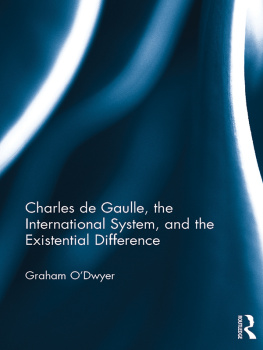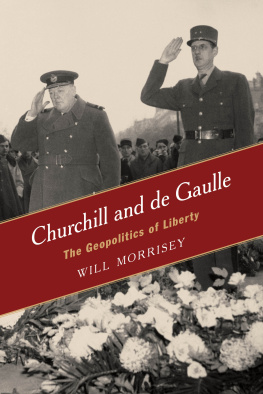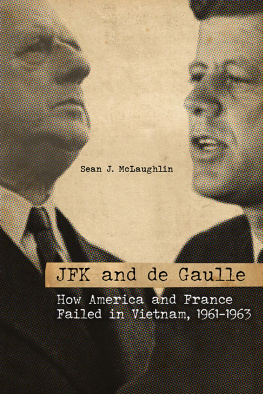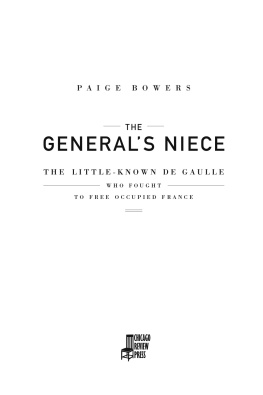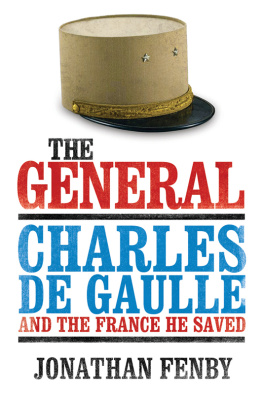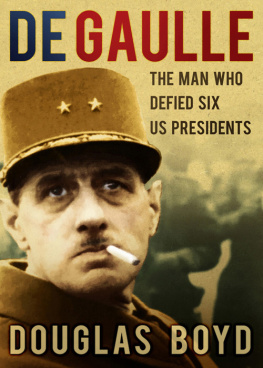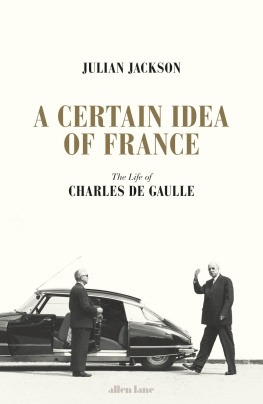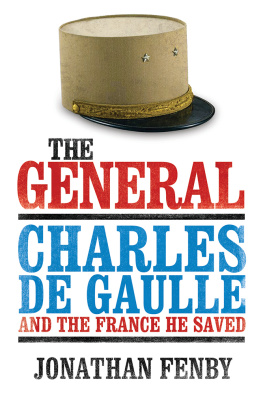Charles de Gaulle, the International System, and the Existential Difference
This innovative account of Charles de Gaulle as a thinker and writer on nationalism and international relations offers a view of him far beyond that of a traditional nationalist. Centring on the way de Gaulle regarded nations as individuals the author frames his argument by rationalising de Gaulles nationalism within the existential movement that flowed as an intellectual undercurrent throughout early and mid-twentieth-century France. Graham ODwyer asserts that this existentialism of the nation and the presence of the past allowed de Gaulle to separate the nation from the state when looking at China, Russia, Vietnam, and East European countries, enabling him to understand the idiosyncrasies of specific national characters better than most of his contemporaries. This was especially the case for Russia and China and meant that he read the Cold War world in a way that Washington and London could not, allowing him a unique insight into how they would act as individuals and in relation to other nations.
Graham ODwyer is a lecturer at the University of Reading.
Charles de Gaulle, the International System, and the Existential Difference
Graham ODwyer

First published 2017
by Routledge
2 Park Square, Milton Park, Abingdon, Oxon, OX14 4RN
and by Routledge
711 Third Avenue, New York, NY 10017
Routledge is an imprint of the Taylor & Francis Group, an informa business
2017 Graham ODwyer
The right of Graham ODwyer to be identified as author of this work has been asserted by him in accordance with sections 77 and 78 of the Copyright, Designs and Patents Act 1988.
All rights reserved. No part of this book may be reprinted or reproduced or utilised in any form or by any electronic, mechanical, or other means, now known or hereafter invented, including photocopying and recording, or in any information storage or retrieval system, without permission in writing from the publishers.
Trademark notice: Product or corporate names may be trademarks or registered trademarks, and are used only for identification and explanation without intent to infringe.
British Library Cataloguing in Publication Data
A catalogue record for this book is available from the British Library
Library of Congress Cataloging in Publication Data
Names: O'Dwyer, Graham, author.
Title: Charles de Gaulle, the international system, and the existential difference / Graham O'Dwyer.
Description: Abingdon, Oxon ; New York, NY: Routledge, 2017. | Includes bibliographical references and index.
Identifiers: LCCN 2016040556 | ISBN 9781472437556 (hardback) | ISBN 9781315571348 (e-book)
Subjects: LCSH: Gaulle, Charles de, 1890-1970--Political and social views. | International relations--Philosophy. | Nationalism--Philosophy. | Existentialism. | World politics--1945-1989. | France--Foreign relations--1945-1958.
Classification: LCC DC420 .O38 2017 | DDC 327.101--dc23
LC record available at https://lccn.loc.gov/2016040556
ISBN: 9781472437556 (hbk)
ISBN: 9781315571348 (ebk)
I am deeply grateful to a number of people for their generous help and valuable contributions to this book. In particular I would like to thank my former colleagues at the University of Kent who read through the initial draft chapters and offered their valuable insights on various philosophical and ontological aspects of international relations (IR), the existential tradition, and the course of recent French history (thank you in particular to Iain MacKenzie, Adrian Pabst, and Jane OMahony). I would also like to thank Andrew Wroe and George Conyne for acting as an endless source of wisdom and knowledge on all aspects of the United States over the past few years and for putting up with my never-ending questions on American politics and American diplomatic history (thank you for all the coffee too!). I also thank Andrew Williams at the University of St Andrews whose encouragement for this project and his reading of my very early draft chapters was certainly heartening and contributed greatly to the finished product. Thanks also go to the editorial team at Routledge and my anonymous reviewers for their enthusiasm for the book. In particular I thank Rob Sorsby whose infinite patience and guidance has been most welcome (and very much needed), and to Claire Maloney for her careful reading of the final manuscript (although any errors in the text remain entirely my responsibility). I would also like to offer a special thank you to my former students at Kent whose genuine diligence, intellectual curiosity, and good nature have been a constant source of inspiration and humour. In particular I thank those who took my modules on Foreign Policy Analysis and US Foreign Policy between 2010 and 2014 and whose questions, criticisms, and comments on some of the themes presented here helped to develop the text. Finally, and above all, I offer my boundless gratitude to my parents (Norma and Wayne ODwyer) for their unwavering support and constant inspiration, and for acting as a constant source of good humour in my life. Please keep feeding Ginny and looking out for the barn owls.
French philosopher Rgis Debray once claimed that historys giants are historys great political myths. They appear, that is, as fleeting intrusions in our lives that decimate or exhaust us and leave a lasting mark on the world. In using the term myth, Debray does not mean to imply that historys giants are some form of imagined beings that lack a tangible existence, rather that certain personalities exert an omnipresent force that leaves a wake behind it and which, at least for a time, turns the world upside down. It is true to say that most of us will never meet such an individual and instead we tend to create subjective narratives that, while containing certain kernels of truth, are largely fictionalised accounts. It is in this sense that man becomes myth and, while we may have no formal acquaintance with such giants, we nonetheless sense the aftershocks of their actions. As inheritors of the historical, that is, we live with the legacies of their actions and are condemned to swim in the wakes that transcend the era in which they lived. This is true of figures such as Bonaparte and the two decades that he dominated European affairs, of Vladimir Lenin and his sense of the natural laws of history in relation to Czarist Russia, of Franklin Roosevelt and his radical expansion of the American state in the 1930s and 1940s, of Margret Thatcher and her injection of a dose of Hayekian economic thought into the heart of British political life, and of Deng Xiaopings reorientation of the Chinese economy in the latter years of the twentieth century. As conductors of their time such giants seem to condition and orchestrate the world around them in a way that few others do.
While the consequences of Vladimir Putins vision of politics both within Russia (and the democratic recession that he possibly represents) and on the international stage may see him join such illustrious company it is surely the case that this books central focus, Charles de Gaulle, sits among the cast of historical leviathans and myths as a consequence of his potent sense of France, his actions in saving France in the 1940s, his creation of the French Fifth Republic in the 1950s, and his actions on the world stage which he sought to influence and bend to his cast-iron will during the 1960s. Indeed, de Gaulle understood that for most Frenchmen and Frenchwomen he was a mythical figure and spoke of how his subsequent political career was conditioned by the public image that had formed around him. There was, in other It is interesting to ponder how true this is for other world leaders who, due to their stature and importance, take on a similar status within their respective nations.

